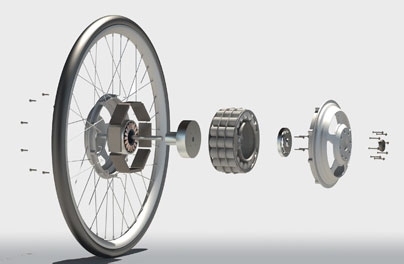MIT researchers unveiled a major new project on Oct. 10 in Copenhagen aimed at transforming bicycle use in Denmark's largest city, promoting urban sustainability and building new connections between the city's cyclists.
The project, called SmartBiking, will utilize a novel self-organizing smart-tag system that will allow the city's residents to exchange basic information and share their relative positioning with each other. The project will be implemented citywide in time for the November 2009 U.N. Climate Change Conference, which Copenhagen will host.
"One of the most striking aspects of Copenhagen is that it is already a very sustainable city," said Carlo Ratti, Director of MIT's SENSEable City Lab, which is overseeing the Smart Biking project. "A considerable fraction of its energy comes from renewable sources and, unlike a few decades ago, 30 to 40 percent of its citizens use bicycles as their primary method of transportation.
"So our challenge was, 'How can we enhance these dynamics of sustainability? And how can we use technology to make them more widespread?'"
Beyond encouraging Copenhagen's citizens to ride more often, the program aims to help them interact as well.
"We have developed a Facebook application called 'I crossed your path,' which creates a social network for cyclists, allowing them to link up with people they may have ridden past during the day and potentially establish new connections," explained Christine Outram, the principal research assistant on the project.
The smart tags will also allow individuals to monitor the distance they travel while cycling as part of a citywide "green mileage" initiative, which is similar to a frequent-flyer program.
What will the reward for green miles be? "A year of free Muesli," mused SENSEable City Lab's Associate Director Assaf Biderman. "The very act of sharing this information and showing individuals the environmental impact of their actions could be very powerful. Research has shown that behavioral change is one of the most powerful forces to tackle climate change and the reduction of carbon emissions."
Ultimately, fine-grained monitoring of urban activities could allow cities such as Copenhagen to enter carbon-trading schemes. Cities could obtain funding for sustainable city services in exchange for their efforts to cut carbon dioxide emissions. The impact could be considerable, as cities account for approximately half of the world population, but are responsible for a much larger share of carbon emissions.
Finally, as part of the project, a prototype of a smart bicycle is being developed in collaboration with the MIT Media Lab's Smart Cities Group at the MIT Media Lab, directed by William J. Mitchell, the Alexander W Dreyfoos (1954) Professor of Architecture and Media Arts and Sciences. This hybrid bicycle uses a regenerative motor to harvest the energy created when braking and release it while cycling, in a manner similar to hybrid cars. Everything, including the battery, is packed in the rear wheel, which becomes a self-contained element that could be retrofitted on most existing bicycles.
The Smart Biking Project is developed by the SENSEable City Laboratory, an MIT research group focused on technology and urban planning that is a part of the MIT Department of Urban Studies and Planning, together with the MIT Design Lab. In addition to professors Ratti and Mitchell, the team comprises Assaf Biderman, Francesco Calabrese, Michael Lin, Mauro Martino and Outram.







